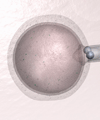December
Change in law for pioneering IVF technique one step closer

Newcastle scientists have welcomed the news that a pioneering IVF-based technique they are developing to reduce the risk of mitochondrial diseases is one step closer to be available.
Draft regulations were put before Parliament today that could, if passed, enable a pioneering IVF-based technique developed at Newcastle University to be made available.
Every year, around one in 6,500 children are born with severe mitochondrial diseases which can cause muscular weakness, blindness, heart failure, liver failure, learning disabilities and diabetes and can also lead to death in early infancy.
Supported by funding from the Wellcome Trust, the new techniques being developed by the team at Newcastle University involves transferring the nuclear DNA from the mother – which has all the characteristics such as height, eye colour, and hair colour – into a donor egg which has had the nuclear DNA removed. Any child born as a result of this technique would have the nuclear DNA from its parents, but the healthy mitochondria from the donor egg. This would allow the mother to have a much greater chance of giving birth to a healthy child, and potentially greatly reduce the risk to subsequent generations.
A provision in the Human Fertilisation Act tabled today will be debated by Parliament in the New Year. If passed, the new regulations will allow the Human Fertilisation and Embryology Authority (HFEA) to consider a licence for the technique to be used in Newcastle.
Professor Mary Herbert of Newcastle University and Scientific Director at Newcastle Fertility Centre at Life said: “Our research on optimising the techniques to prevent transmission of mitochondrial DNA disease is progressing well and we are very pleased that the regulatory process is moving forward.”
Professor Alison Murdoch, Professor of Reproductive Medicine at Newcastle University and Newcastle Fertility Centre at Life, part of Newcastle Hospitals NHS Foundation Trust, said:
“We are delighted that the government is taking this forward. The research in Newcastle is progressing quickly now, thanks to all those women who are continuing to support us by donating their eggs. But we still need more donors to come forward to enable us to drive this research forward so that we can change the lives of the many families affected. Women who are interested in becoming potential donors should go to www.ncl.ac.uk/eggdonate.”
In March 2013 the HFEA released the findings of a consultation which showed general public support for the use of the technique. This was followed in June 2013, by the Chief Medical Officer outlining support for a change in the law to allow the technique to be used in patients.
published on: 17 December 2014
